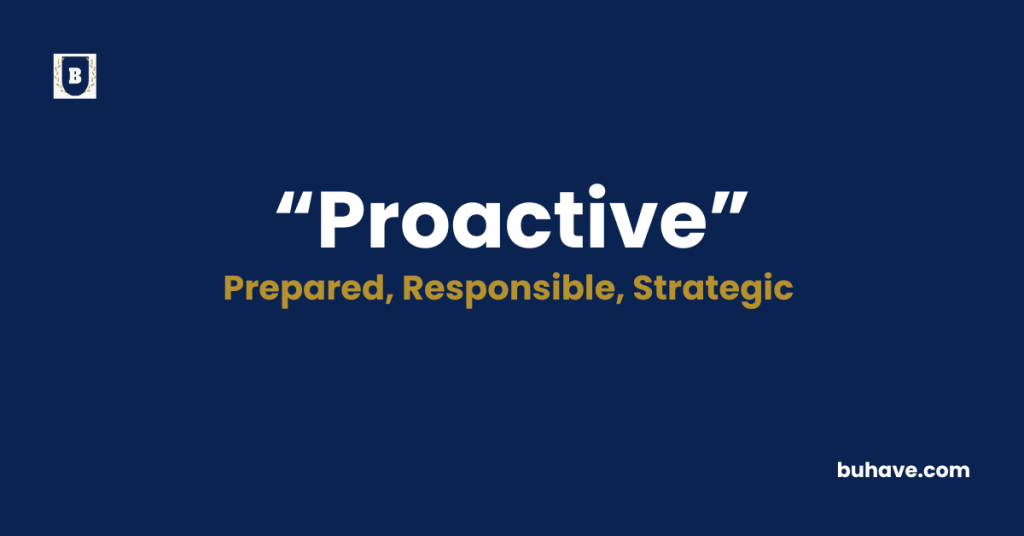The word ‘Proactive’ (Adjective) describes someone who takes initiative, anticipates future challenges or needs, and acts in advance to address them. In this guide, you’ll learn the full definition, synonyms, antonyms, etymology, and real-life examples of how to use ‘Proactive’ correctly in sentences.
Proactive Explained in Depth
A complete and detailed guide to the word Proactive including meaning, definition, examples, etymology, synonyms, and antonyms.
Meanings of Proactive
The word proactive is used to describe behavior that involves taking control of situations by causing things to happen rather than just responding after they occur. A proactive person or approach emphasizes preparation, planning, and forward-thinking action. Rather than waiting for problems to arise and reacting to them, being proactive means foreseeing potential issues or opportunities and addressing them early. For example, a proactive employee might notice an inefficiency in the workflow and suggest improvements before it becomes a larger problem. Similarly, a parent might teach their child about safety before an incident occurs, showing a proactive concern for well-being.
In both personal and professional contexts, being proactive is considered a highly valuable trait. It demonstrates responsibility, leadership, and confidence. Proactive individuals typically show high levels of awareness, motivation, and strategic thinking. They’re often the ones who drive innovation, manage risks effectively, and keep things running smoothly. This mindset can lead to better results, stronger relationships, and more successful outcomes because it minimizes surprises and maximizes preparedness. Whether it’s organizing your week in advance, scheduling regular maintenance, or learning new skills to stay competitive, being proactive keeps you one step ahead.
Definition
Proactive refers to the act of creating or controlling a situation by causing something to happen, rather than just responding to it after it has happened. It involves taking initiative, being forward-thinking, and preparing for potential problems or opportunities. Proactive behavior is intentional, strategic, and often leads to more effective and efficient outcomes.
Rather than being reactive, where someone waits until an issue arises before dealing with it, proactive individuals anticipate outcomes and take preemptive actions. For instance, a proactive teacher might revise their lesson plan based on anticipated student challenges, or a proactive business might invest in technology ahead of a known industry shift.
This proactive stance can be applied to daily habits, long-term planning, health, finances, communication, and virtually every aspect of life. In essence, proactivity is about being in the driver’s seat of your actions and decisions, promoting self-responsibility and personal empowerment.
Etymology
The etymology of the word “proactive” reveals its relatively modern development from older, classical roots. Here’s a breakdown of its linguistic history:
- Prefix: “Pro-” – From Latin, meaning “before,” “forward,” or “in favor of.”
- Root: “Active” – Derived from the Latin “activus,” which means “to do” or “capable of acting.”
Thus, “proactive” literally means “acting in advance” or “moving forward with action.” While the word has Latin roots, it did not appear in popular usage until the mid-20th century. It gained widespread recognition through the field of psychology and management, particularly after being highlighted by psychologist Viktor Frankl and later popularized in business contexts by Stephen Covey’s book, “The 7 Habits of Highly Effective People.” In that work, Covey emphasized proactivity as the foundation of personal and professional success, distinguishing it from reactivity. He encouraged people to take responsibility for their actions, instead of allowing external events or emotions to dictate their behavior.
Since then, the word has become a staple in personal development, corporate leadership, education, and health fields. It represents a philosophy of anticipation, preparation, and ownership over one’s decisions. This evolution underscores the increasing societal value placed on foresight and initiative in both individual growth and organizational success.
Example Sentences
- She took a proactive approach to her career by signing up for new training courses.
- The company’s proactive customer service policies helped prevent issues before they escalated.
- By planning their meals for the week, they stayed healthy and avoided stress.
- His proactive mindset helped the team avoid last-minute crises during the project launch.
- Parents should be proactive in teaching their kids about online safety.
Proactive Synonyms
- Prepared
- Forward-thinking
- Preventive
- Initiating
- Preemptive
- Positive
- Self-starting
- Enterprising
- Energetic
- Strategic
Proactive Antonyms
- Reactive
- Passive
- Unresponsive
- Indifferent
- Negligent
- Idle
- Disengaged
- Unprepared
- Sluggish
- Inattentive
FAQs about Proactive
Here are some frequently asked questions (FAQs) about the word “Proactive”
1. What does “proactive” mean in simple terms?
It means taking action before something happens, rather than waiting and reacting afterward.
2. Is being proactive better than reactive?
Yes, in most cases. Proactive behavior allows you to prepare for and potentially avoid problems.
3. Can someone learn to be proactive?
Absolutely. Proactivity is a skill that can be developed through awareness, planning, and habit-building.
4. What are examples of proactive behavior?
Setting goals, planning ahead, addressing issues early, and taking initiative at work or home.
5. Is proactive a personality trait or a choice?
It can be both. Some people are naturally more proactive, but anyone can choose to act proactively.
6. How does being proactive help in the workplace?
It improves productivity, reduces stress, and shows leadership by preventing small problems from becoming big ones.
7. Can organizations be proactive?
Yes, companies that plan for future trends or potential risks tend to be more resilient and successful.

















